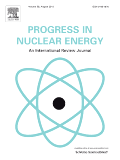
Progress in Nuclear Energy
metrics 2024
Pioneering research for a safer nuclear future.
Introduction
Progress in Nuclear Energy is a premier academic journal published by Pergamon-Elsevier Science Ltd, dedicated to advancing the field of nuclear energy and its applications. With an ISSN of 0149-1970 and an E-ISSN of 1878-4224, this journal has made significant contributions to the scholarly community since its inception in 1977. The journal is recognized for its rigorous peer-reviewed research and has achieved impressive standings in multiple categories, including being ranked Q1 in Nuclear Energy and Engineering and Safety, Risk, Reliability and Quality for 2023. Its impact factor highlights the relevance and influence of the published work within the field. Researchers, professionals, and students seeking a comprehensive overview of current developments will find valuable insights in its pages. Covering a broad time span of publishing years, from 1977 through 2024, Progress in Nuclear Energy remains an essential resource for those involved in the energy sector, particularly in designing sustainable and safe nuclear technologies.
Metrics 2024
 0.79
0.79 3.30
3.30 2.90
2.90 82
82Metrics History
Rank 2024
Scopus
IF (Web Of Science)
JCI (Web Of Science)
Quartile History
Similar Journals
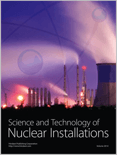
Science and Technology of Nuclear Installations
Fostering Collaboration in the Nuclear Science CommunityScience and Technology of Nuclear Installations, published by HINDAWI LTD, is an esteemed scholarly journal specializing in the dynamic field of nuclear energy and engineering, with an ISSN of 1687-6075 and an E-ISSN of 1687-6083. Since transitioning to an Open Access model in 2007, the journal has significantly contributed to the dissemination of innovative research and practical applications in nuclear technology, attracting a global audience from both academia and industry. Based in Egypt, this prominent journal serves as a vital platform for researchers seeking to explore advanced methodologies, cutting-edge technologies, and the sustainable development of nuclear installations. Achieving a commendable Q2 category ranking in Nuclear Energy and Engineering and positioning at #35/77 in Scopus rankings (55th percentile) underscores its influential presence within the scientific community. With a publication horizon extending from 2008 to 2024, the journal remains committed to fostering collaboration and innovation in nuclear science, making it an invaluable resource for researchers, professionals, and students alike.
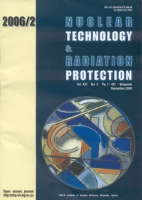
Nuclear Technology & Radiation Protection
Exploring the frontiers of nuclear energy and safety.Nuclear Technology & Radiation Protection is a distinguished open-access journal published by the VINCA Institute of Nuclear Sciences, Serbia, dedicated to advancing knowledge in the fields of nuclear energy and radiation safety. Since its inception in 2002, the journal has been an essential resource for researchers, professionals, and students, offering a platform for the dissemination of high-quality research that contributes to the safe and efficient use of nuclear technology. With an impressive Q2 ranking in both the Nuclear Energy and Engineering and Safety, Risk, Reliability and Quality categories for 2023, the journal reflects a commitment to excellence and relevance within its scope. It serves as a pivotal forum for sharing innovative findings, addressing current challenges, and contributing to the global discourse on nuclear safety and technology. The journal is indexed in Scopus, enhancing its visibility and impact in the academic community. By facilitating unrestricted access to its articles, Nuclear Technology & Radiation Protection continues to foster collaboration and engagement among scholars in the nuclear science domain.

Radiation Detection Technology and Methods
Bridging Theory and Application in Nuclear PhysicsRadiation Detection Technology and Methods is a prominent academic journal published by Springer Singapore Pte Ltd, dedicated to advancing the field of nuclear and high-energy physics, as well as nuclear energy and engineering. Established in 2017, this journal provides a platform for the dissemination of pioneering research and innovative methodologies in radiation detection technology. As of 2023, it holds a commendable Q2 ranking in both the categories of Nuclear and High Energy Physics and Nuclear Energy and Engineering, underscoring its significance in fostering scholarly discourse within these vital fields. With ISSN 2509-9930 and E-ISSN 2509-9949, the journal aims to cater to a diverse audience of researchers, professionals, and students, emphasizing open access to knowledge. The journal's contributions are particularly crucial for those engaged in the development of safer and more efficient radiation detection techniques, ultimately bridging the gap between theory and practical applications in energy security and health physics. For researchers seeking a dedicated outlet for their work, Radiation Detection Technology and Methods represents an invaluable resource and an opportunity to influence the future of radiation science.

ATOMIC ENERGY
Harnessing the power of nuclear advancements.ATOMIC ENERGY is a distinguished journal published by SPRINGER, focusing on pivotal advancements and research within the field of Nuclear Energy and Engineering. With an ISSN of 1063-4258 and an E-ISSN of 1573-8205, this journal has been a critical resource since its inception in 1956, serving both historic and contemporary scientific inquiries into nuclear technologies. Currently positioned in Q3 of the Nuclear Energy and Engineering category, ATOMIC ENERGY ranks 49 out of 77 in Scopus, representing a percentile of 37%, highlighting its relevance in the research community. While it is not an open access journal, it continues to draw a diverse readership eager to engage with the latest findings and innovations in nuclear science. The journal’s objectives include fostering collaborative research, sharing expertise, and addressing contemporary challenges in nuclear energy. As such, ATOMIC ENERGY remains an essential platform for researchers, professionals, and students alike, contributing significantly to the ongoing dialogue in the field.
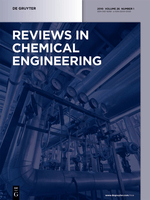
REVIEWS IN CHEMICAL ENGINEERING
Exploring Innovations for a Sustainable Future.REVIEWS IN CHEMICAL ENGINEERING, published by Walter de Gruyter GmbH, is a premier journal that delivers cutting-edge insights and comprehensive reviews in the field of chemical engineering. Established as an eminent resource since 1982, this journal is committed to advancing knowledge and fostering innovation in various domains of chemical engineering, including process design, materials, and environmental considerations. With an impressive Q1 ranking in the 2023 Scopus category for Chemical Engineering and a commendable 20th position out of 273 journals, it is recognized for its rigorous peer-review process and high-impact contributions. Although it operates under a subscription model, the journal remains a vital platform for researchers and professionals aiming to stay at the forefront of technological advancements and scholarly discourse in chemical engineering. With a focus on interdisciplinary applications and real-world relevance, REVIEWS IN CHEMICAL ENGINEERING is an indispensable resource for academics, industry professionals, and students dedicated to excellence in this field.

THERMAL ENGINEERING
Pioneering Research in Energy and Power EngineeringTHERMAL ENGINEERING is a premier journal dedicated to advancing the field of thermal engineering, with particular importance in the domains of Energy Engineering, Nuclear Energy, and Power Technology. Published by PLEIADES PUBLISHING INC, this esteemed journal has been providing significant scholarly contributions since its inception, with its converged years spanning from 1970 to 2024. Though currently non-open access, the journal presents a unique avenue for researchers, professionals, and students to explore groundbreaking research and innovative solutions related to energy systems and thermal processes. With a notable impact factor and positioned in the Q3 quartile for both Energy Engineering and Nuclear Energy, THERMAL ENGINEERING ensures the dissemination of high-quality research with a global reach, making it an essential resource for those looking to stay at the forefront of essential energy technologies and engineering advancements.
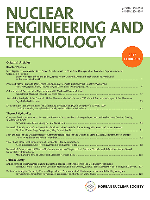
Nuclear Engineering and Technology
Advancing the Future of Nuclear EnergyNuclear Engineering and Technology, published by the Korean Nuclear Society, is a premier Open Access journal dedicated to the rapidly evolving fields of nuclear energy and engineering. Established as a significant platform for scholarly communication since 2008, this journal has consistently anchored itself in the academic community, achieving a Q2 ranking in its category as of 2023, reflecting its influence and quality within the domain of Nuclear Energy and Engineering. With an impressive Scopus ranking of #15 out of 77, positioning it in the 81st percentile, the journal publishes cutting-edge research that addresses both fundamental and applied aspects of nuclear technology. Nuclear Engineering and Technology embraces an open access model since 2013, ensuring that valuable research is accessible to a global audience, thereby enhancing collaboration among researchers, professionals, and students passionate about advancing nuclear technology. The journal serves as an essential resource for those aiming to innovate and push the boundaries of knowledge in nuclear sciences.
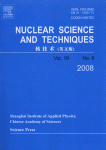
Nuclear Science and Techniques
Connecting Researchers to the Heart of Nuclear InnovationNuclear Science and Techniques is a distinguished peer-reviewed journal published by Springer Singapore Pte Ltd, dedicated to advancing the fields of nuclear science and engineering. With an impressive impact factor reflected in its 2023 quartile rankings—Q2 in Nuclear and High Energy Physics and Q1 in Nuclear Energy and Engineering—the journal serves as a vital resource for researchers, professionals, and students alike. Covering a breadth of topics from nuclear physics to energy applications, it offers a platform for innovative research and developments in the nuclear domain. The journal, indexed under ISSN 1001-8042 and E-ISSN 2210-3147, aims to foster scientific exchange and collaboration within the community by publishing high-quality articles that contribute significantly to the field. Committed to maintaining an open-access ethos, it enhances visibility and accessibility of critical knowledge, making it an essential source for current insights and trends in nuclear science.
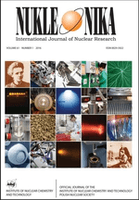
NUKLEONIKA
Unveiling the Mysteries of Matter and EnergyNUKLEONIKA, published by SCIENDO, is a leading open access journal that has been serving the scientific community since its establishment in 1968. Focused on the domains of Nuclear and High Energy Physics, Condensed Matter Physics, and Nuclear Energy and Engineering, this journal provides a platform for innovative research and technological advancements in a variety of interdisciplinary fields. With an impressive history of publications and a current Q3 ranking in several categories, including Safety, Risk, Reliability and Quality and Waste Management and Disposal, NUKLEONIKA is recognized for its significant contributions to scientific discourse. Open access since 2014, the journal ensures that all research outputs are freely available, facilitating broad dissemination and accessibility for researchers, professionals, and students alike. Located in the heart of Warsaw, Poland, NUKLEONIKA aims to inspire collaborative efforts and foster a deeper understanding of complex physical phenomena and their practical implications.
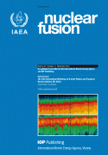
NUCLEAR FUSION
Empowering the scientific community through rigorous scholarship.NUCLEAR FUSION is a prestigious academic journal published by IOP Publishing Ltd, dedicated to advancing the field of nuclear and high-energy physics. With a significant impact factor and recognized among the top-tier journals, it boasts a Q1 ranking in both Condensed Matter Physics and Nuclear and High Energy Physics as of 2023. This journal, which has been published continuously since 1969, serves as a vital platform for researchers, professionals, and students exploring the latest advancements in fusion energy, plasma physics, and the intricate phenomena associated with high-energy states of matter. By disseminating original research, comprehensive reviews, and interdisciplinary studies, NUCLEAR FUSION strives to foster innovation and collaboration in pursuit of sustainable energy solutions, contributing significantly to the scientific community’s understanding of nuclear fusion processes. While the publication offers access options that enhance its reach, its rigorous peer-review process ensures the highest quality of scholarly communication.